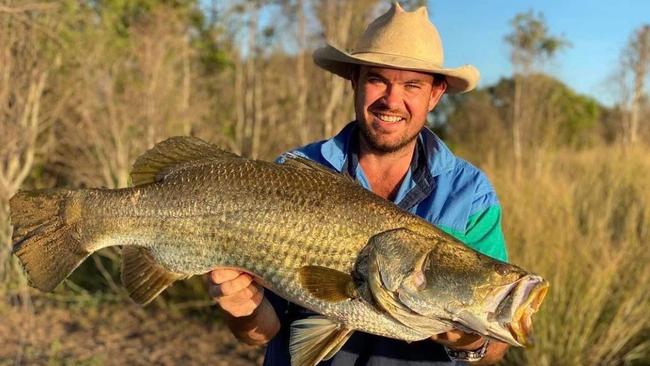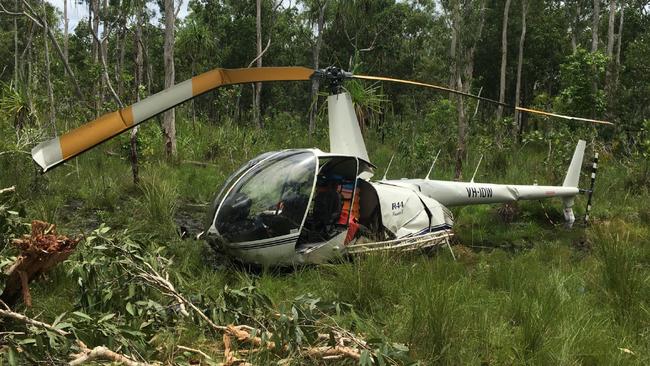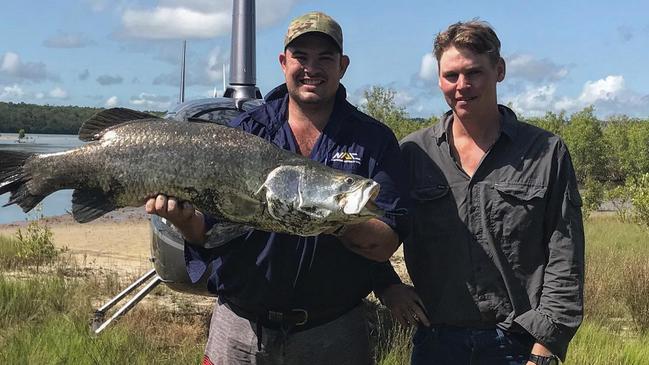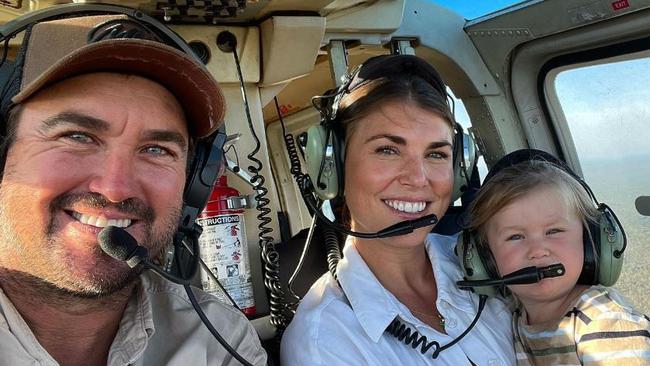Outback Wrangler Matt Wright shuts Helibrook following fatal chopper crash
Outback Wrangler host Matt Wright is shutting down his aviation company and selling his choppers following the fatal crash that killed co-star Chris Wilson.

Outback Wrangler host Matt Wright is shutting down his aviation company Helibrook and is selling his choppers following the fatal crash that killed co-star Chris “Willow” Wilson and left his pilot paraplegic.
Wilson, 34, was killed when the Robinson R44 he was slinging beneath – during a crocodile egg collecting mission – crashed in a remote part of West Arnhem Land, in the Northern Territory, last year.
Pilot Sebastian Robinson, a licensed aircraft maintenance engineer and, at the time, Helibrook’s head of aircraft airworthiness and maintenance control, suffered severe spinal injuries and is still undergoing significant surgeries.
Following an 18-month investigation, the Australian Transport Safety Bureau on Wednesday released its 113-page final report into the accident, finding that the helicopter “likely” – being a 66 percent chance – collided with terrain soon after take-off due to fuel exhaustion.
The national transport safety watchdog’s damning report also laid bare a litany of failures and serious safety issues involving the Civil Aviation Safety Authority and Helibrook.
“The ATSB found that Helibrook’s CASA-approved safety management system was not being used to systematically identify and manage operational hazards,” the findings stated.
“As a result, the risks inherent in conducting human sling operations, such as carriage of the egg collector above a survivable fall height, were not adequately addressed.”
In January 2020, Helibrook had introduced a CASA-accepted safety management system (SMS) in conjunction with CASA’s approval of Wright as Helibrook’s chief pilot.

Helibrook’s operations manager and drug and alcohol management plan officer Morgan Vidler was appointed to the additional role of safety manager.
“An assessment of the operator’s SMS following the accident quickly identified that in the 2 years since its approval, Helibrook had not implemented the system described in the SMS manual,” the ATSB said.
“In not using their SMS, Helibrook did not identify the risks associated with conducting human external cargo operations, particularly the carriage of the egg collectors at non-survivable fall heights, and ensure they were adequately managed.”
The ATSB said that although not likely to result in sudden power loss, engine defects present at the time of the accident – including low compression in one cylinder and valve clearances out of service limits – likely affected the engine’s maximum power output and fuel consumption.
“Additionally, Helibrook had likely overrun the helicopter’s maintenance, inspection and overhaul periods, which increased the likelihood of the helicopter experiencing a technical failure or malfunction,” the report said.
Mr Robinson, who had flown VH-IDW for years, told the ATSB that the hour meter was “never running” when he operated the helicopter and that he did not know if it was connected on the day of the crash.
A Robinson R44 helicopter – such as the one involved in the crash – must be overhauled at 2,200 hours or 12 years’ service, which costs about $400,000.
The CASA approval instrument Helibrook was conducting crocodile egg collecting under states that all emergency equipment on board the helicopter must be serviceable.
“Finally, the ATSB found that the helicopter’s emergency locator transmitter had been removed from its mount prior to the accident,” the report said.
“Therefore, it could not activate automatically, which likely delayed the emergency response.
“Although prompt medical attention would not have altered the outcome for the egg collector, the pilot’s condition likely worsened over time since the accident … more timely initiation of medical assistance would have reduced the risks of exacerbating the pilot’s injuries and deterioration of their condition.”
The pilot was lying in a crocodile-infested swamp for more than three hours before CareFlight arrived.

The ATSB said its on-site examination two days later identified that “no ELT was fitted to the helicopter”.
“The ATSB was subsequently provided with an ELT by the helicopter operator, who reported that they had removed it from the site after the accident,” the report said.
“They advised that it was typically carried under one of the seats, otherwise it would get wet and erroneously activate.
“The produced ELT was registered to a former Helibrook chief pilot and not associated with any aircraft registration.”
The Australian Maritime Safety Authority confirmed to the ATSB that previous unintended ELT activations had occurred due to water ingress and identified one record of activation of the ELT associated with VH-IDW, which occurred in December 2021.
A Helibrook representative had advised AMSA that the ELT had self-activated, likely due to water making contact with the ELT while collecting crocodile eggs.
That ELT was not the one Wright provided to the ATSB after the fatal crash.
Helibrook’s safety manager Morgan Vidler, who performed the role remotely from Queensland, told the ATSB he was unaware that VH-IDW’s ELT was not installed at the time of the crash.
“The safety manager did not conduct an internal investigation into the accident involving VH-IDW and several months after the accident reported that they did not know what happened, had not seen the aircraft or been able to obtain any information about it,” the ATSB said.
“As the drug and alcohol management plan officer, the safety manager had also not requested testing of the accident pilot.”
In interviews with the ATSB, Vidler described Helibrook’s reporting culture as “not great” with only one incident in Helibrook’s safety reporting system – a hard landing at Wright’s Top End Safari Camp involving VH-XHB in August 2020 – while he was at the site.
About 10 days later, Vidler had submitted an incident report to ATSB stating the pilot was the only person on board at the time of the accident.
“However, the ATSB obtained footage taken by one of 3 passengers on board at the time,” the ATSB said.
“The safety manager was nearby at the time of the accident and, despite the detail on the incident report, reported being unaware how many people were on board.
“The safety manager was also the Helibrook DAMP officer and had not requested drug and alcohol testing of the pilot following that incident, as they did not think the incident was sufficiently serious to warrant it.”

Since the fatal crash last year, Helibrook has ceased operating.
“They further advised that their helicopter fleet was being sold and the chief executive officer/chief pilot was no longer involved with the operation” the ATSB said.
“CASA confirmed that Helibrook was suspended from operation as it no longer had the required key personnel.
“Under those circumstances the operator’s safety management system was no longer in use. The identified safety issue was therefore closed as no longer relevant.”
After the report was published on Wednesday, Wright shared a video on social media saying that the investigation had been focussed on him, rather than the cause of the accident.
“Nothing’s gonna bring our mate back but I hope this report does bring some closure on how this accident happened. Doesn’t make it any easier,” he said.
“The focus of this investigation has been about Willow and myself because we’ve been on TV but not about the cause of the accident.
“Anyway, that’s my take on it.”


